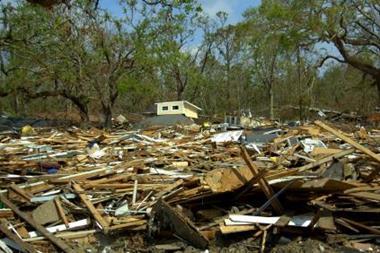The debate continues on continuity terminology. Peter Power gives his view
The April edition of StrategicRISK included a feature on 'Coping with a Crisis' that really helped to expand the debate on what we should call the onset of a possible catastrophe – and I think for a very good reason. Anyone browsing the recent World Economic Forum (WEF) Global Risks report 2007 will spot comments such as a ‘fundamental disconnect between risk and mitigation’, ‘levels of risk are rising’ and ‘mechanisms to manage and mitigate risk at the level of businesses, government and global governance are inadequate’ (and that is only the first paragraph). In other words, catastrophes and crises are set to increase everywhere. However, does recent guidance from the British Standards Institute (BSI) for example, live up to this threat?
Anyone reading the new Business Continuity (BC) code of practice BS25999 (part 1), published by the BSI, will see nothing about crisis management, but will see a few pages about incident management instead. So what? Perhaps you think it does not matter what we should call the crucial and rapid intervention point at the acute phase of a likely catastrophe? However, it has become clear, since publication of part 1 of the new BC guide, that many people do feel there is something wrong here. Surely the word 'crisis' is more precise and accurate? On the other hand, the noun 'incident' might be less troublesome to digest for the stakeholders of the target organisation? Or so the argument goes.
As someone who was part of the small BS25999 team assembling the draft section on what was originally crisis management in the new BC guide, I am acutely aware that the end product refers to 'incident' rather than 'crisis management', purely on the basis of not upsetting stakeholders and using a more emollient description of a possible catastrophe. What nonsense! I disagreed at the time and, based on the many comments in the April issue of StrategicRISK, it seems I am in good company.
I confess to feeling a sense of loyalty to my fellow team members, but they will know that I (and others) simply do not agree that the sudden impact of a drama hitting any organisation can accurately be massaged into nothing more than just an incident. Why?
Crisis (management) is a precise, honest and eponymous noun (phrase). It does not mean out of control, any more than having a sudden puncture means automatically losing control of a car. In such a case you have a crisis that jeopardises your task (ie driving in a straight line) and needs immediate action to control the vehicle, stop it hitting anyone else and get to the hard shoulder as soon as possible. From then on it is recovery.
I think you can draw some parallels with possible business disruption. To quote the Concise Oxford English Dictionary, a crisis is ‘a time of intense difficulty or danger’. It is short lived and requires special skills to respond. On the other hand, incident is defined as ‘an event or occurrence’ and therefore can mean just about anything over an infinite period of time.
Just suppose for a moment that your organisation has been responsible for some perceived tragedy that ruins the livelihood of several people, or worse. Television news crews show vivid images and interviews from the scene and then turn to your organisation for reassurance that you take the crisis seriously. But you do not. For you it is just an incident and as a result you appear out of touch, uncaring and aloof from reality. It seems you are more concerned about spin than honesty – and then watch your reputation collapse.
When my company runs any crisis management workshop, we advise people to use the obvious noun crisis, but not to go on calling themselves a crisis team once the acute phase has been dealt with and the organisation is well into recovery. That does send to the wrong message to stakeholders. But to pretend at the very outset there is no intense difficulty or anything causing a serious problem, just by giving the event a deliberately vague title simply to assuage any stakeholder fears is, I suggest, rather disingenuous.
It is more from the recipe book of the archetypal spin doctor Alistair Campbell, than from that of Sir Michael Bishop. Bishop, as head of BMI, handled the scene of the Kegworth air crash in 1989. His honest and accurate assessment of the crisis actually resulted in more people subsequently flying with BMI than before. Would that have happened if he denied the obvious and just said this was nothing more than an incident to him?
It is a bit like the moment in 1997 when Jeremy Paxman on BBC TV asked Michael Howard (then Home Secretary in the UK Government) a blatantly simple and very obvious question requiring a yes or no answer. But Howard, following a spin doctor's guide and in front of millions of viewers, assumed the obvious did not apply to him. Better to obfuscate and use words that he felt might reduce the real event. The question was repeated no less than 12 times. Howard looked dishonest and ridiculous.
In a crisis nothing should hinder a first and immediate reaction phase (sometimes referred to as jumping from 'slow time' to quick time'), although this should be a finite period, since the aim is to move to recovery (if applicable) as quickly as possible. The term crisis in this sense, does not mean the organisation is unable to cope. Far from it.
Crisis, rather than incident, refers to the acute crisis phase with its unique pressures and demands that suddenly appear at the beginning of any likely calamity. However, it is vital to note that what descriptive term is used to highlight these first essential activities is not in itself the single most important feature. What is important is to understand what the first vital activities actually are, although this is better achieved by being honest with yourself.
Managing crisis
A crisis management plan should, I suggest, be frequently rehearsed, feasible, relevant and very easy to read. Apart from the main written plan(s), I find many organisations condense advice on dealing with these first critical stages into pocket sized cards that not only list contact details, but logical flow charts, matrices and other aides to 'quick time' crisis (not incident) decision making, very often for use at strategic or board level. In my view, irrespective of the size of an organisation, the primary aim of crisis management is to do the following:
• Respond to what is happening now without wasting disproportionate time to get 100% accuracy about the cause. This may prove impossible in any case.
• Assess the situation from inside and outside the organisation as stakeholders will perceive it. In this sense perception equals reality.
• Identify the immediate, probable impacts and subsequent consequences and get ahead of them. If you do not, the organisation merely becomes an onlooker as its destiny is shaped by others and not by you.
• Direct actions so as to contain the likely or perceived damage spread (this includes reputation, brand protection and so on).
• Identify and activate without any delay, obvious features of the business continuity plan needed to cope.
• Encourage decision makers to take bold and prompt actions. Over reacting – within a previously agreed response structure – is going to be better than under reacting.
Sometimes there will not be an obvious demarcation line between the crisis management and other connected business continuity phases. Moreover, the same personnel may participate both in the crisis management and business continuity teams (in the case of small organisations this is especially so). But whatever the size of the business the key is to recognise the difference between the need for rapid crisis assessments and achievable directions at the start, followed quickly by appropriate business continuity containment and recovery actions – without delay.
In this sense I cannot see any advantage to be had by diluting the situation or pretending to calm the dramatic phase of a sudden business calamity simply by calling it an incident rather than a crisis. As if just doing this makes it better and fools observers. Far from it!
Peter Power is managing director of Visor Consultants Limited. His research on crisis decision making is quoted in the UK Government (Cabinet Office) Guide on Integrated Emergency. He is a special advisor to a number of key organisations including the Canadian Centre for Emergency Preparedness and the Business Continuity (BC) Institute London Forum, Tel: (0)20 79176026, E-mail: info@visorconsultants.com
What's in a name?
Even the briefest of internet searches highlights that there's little consensus on how 'crisis' and 'crisis management' are defined.
• The American Institute for Crisis Management defines 'crisis' as ‘a significant business disruption which stimulates extensive news media coverage. The resulting public scrutiny will affect the organisation's normal operations and also could have a political, legal, financial, and governmental impact on its business.’
• Crisis Management Disaster Recovery website defines 'crisis management' as ‘a systematic response to unexpected events that threaten the people, property and operating continuity of the organisation.’
• Allwords.com says that 'crisis management' is ‘the practice of dealing with crises as they arise and not by any long-term strategic planning.’
• BNET Business Dictionary's definition is more wordy: ‘actions taken by an organisation in response to unexpected events or situations with potentially negative effects that threaten resources and people or the success and continued operation of the organisation. Crisis management includes the development of plans to reduce the risk of a crisis occurring and to deal with any crises that do arise, and the implementation of these plans so as to minimise the impact of crises and assist the organisation to recover from them. Crisis situations may occur as a result of external factors such as the development of a new product by a competitor or changes in legislation, or internal factors such as a product failure or faulty decision making, and often involve the need to make quick decisions on the basis of uncertain or incomplete information.’


















